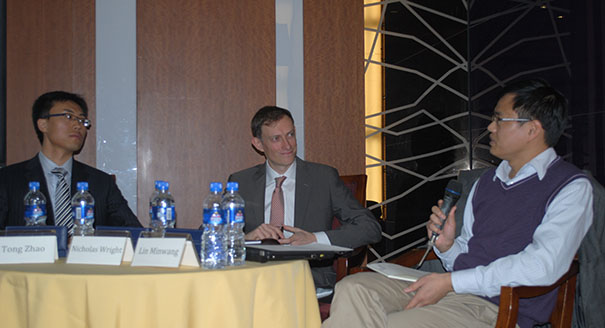Registration
You will receive an email confirming your registration.
A clear understanding of how people make decisions is crucial to accurately forecasting how global leaders will deal with the challenges facing the international community. The knowledge and techniques of neuroscience can contribute to better decisionmaking in crises, enrich our understanding of international relations, and foster a more stable international environment.
Nicholas Wright discussed the contributions that neuroscience can make to the study of international relations. Tong Zhao then moderated a discussion between Wright and Minwang Lin of China Foreign Affairs University.
Discussion Highlights
- Psychology’s Centrality to Deterrence: Both U.S. and Chinese academics and official national security documents acknowledge that deterrence is psychological in nature, because it hinges on the cognitive, and sometimes emotional, responses of one’s intended audience. U.S. military doctrine describes deterrence as a “state of mind” achieved by altering an adversary’s reaction through the threat of force. Similarly, Chinese PLA documents maintain that successful deterrence requires not only sufficient military force and the will to use it, but also persuasive tactics that bring to bear “psychological pressure” to get opponents to change their actions.
- Prediction Errors in International Affairs: Effective security policy involves anticipating how other actors will respond to one’s strategic maneuvers. Such foresight, panelists explained, is linked closely to neuroscentific research on ‘prediction errors’, or the differences between what actors expect to happen and what actually occurs. Panelists asserted that if such discrepancies are very large, unanticipated events might have a magnified impact on others’ subsequent response, as seen in the U.S.-Soviet Cuban Missile Crisis. These insights are vital to achieving precise military-to-military signaling and avoiding inadvertent escalation.
- The Virtue of Unexpected Diplomatic Overtures: Panelists noted that prediction errors are pertinent not only to military affairs but also diplomatic ones. Gestures of goodwill unforeseen by one’s interlocutors can produce even larger benefits than predictable, scripted ones. Panelists cited examples from U.S.-Iran relations, such as Barack Obama’s 2009 video message to Iran and Hassan Rouhani’s 2013 Twitter diplomacy, which both were important developments in striking a more constructive tone to bilateral relations.
- Fairness Dilemmas in International Confrontations: Analysis of human decisionmaking, panelists asserted, must account for social motivations, namely fairness. Like all human beings, leaders are cognitively predisposed to pay a high cost to resist actions that they perceive to be unjust. Panelists again pointed to the example of Iran, whose leaders and citizens has paid an enormous economic and political price to preserve its nuclear program, which they perceive as a just endeavor despite heavy international sanctions. Responding to and negotiating with other state actors, panelists concluded, requires a comprehensive assessment of both their material interests and their perceptions of fairness or its absence.
- Applying Insights of Neuroscience: Panelists proposed criteria to guide experts in applying neuroscientific findings to international policymaking. They suggested that such analytical tools should be based on basic, uncontested tenets of neuroscience that are applicable to real-world political situations. Moreover, these ideas should be framed in simple, concise terms to add conceptual value to policy discussions. Panelists also noted that these insights should be used in concert with other independent evidence to produce analytical conclusions that can hold true in a variety of contexts.
Nicholas Wright
Nicholas Wright is an associate in Carnegie’s Nuclear Policy Program. He applies insights from neuroscience and psychology to decision-making in international confrontations. Prior to joining Carnegie, he examined decision-making using functional brain imaging at University College London and in the Department of Government at the London School of Economics.
Tong Zhao
Tong Zhao is an associate in Carnegie’s Nuclear Policy Program based at the Carnegie–Tsinghua Center for Global Policy. His research focuses on strategic security issues, including nuclear arms control, nonproliferation, missile defense, strategic stability, and China’s security and foreign policy.
